A New Series of Events
(Beginning in 2021)
In 2021 the Research Group on Manuscript Evidence launches a new series of online Events, in quarterly sessions to take the forms of interviews, lectures, webinars, round-tables, workshops, and more. It joins the diverse range of our Activities & Events over the years, which take place at conferences and in other settings, as Seminars, Symposia, Workshops, and other formats.
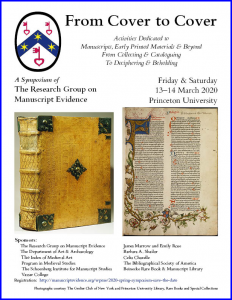
2020 Symposium Poster 1
This new Series was inspired by our first online event, the Pre-Congress Business Meeting in May 2021, which adapted to the conditions of the 2021 International Congress on Medieval Studies (ICMS), taking place wholly online this year after a one-year hiatus in 2020. Customarily, in recent years, we hold Open Business Meetings in person at the Annual Congress, but the changed circumstances of the 2021 Congress encouraged a new tradition.
And so, before the Open Business Meeting later in May at the online Congress, we prepared the ground for it with a Pre-Congress Business Meeting in early May. See our Business Meetings. Available for download, the 2021 Agenda and 2021 Agenda Report tell the story, and help to set the scene.
The Pre-Congress Business Meeting was hosted by our Associate, Barbara Williams Ellertson. At the Meeting, plans arose for more online events. It seemed clear that the Research Group could progress with gatherings by such means, to consider a variety of subjects, already before the chance could return to resume meetings in person — like our 2020 Spring Symposium, “From Cover to Cover”, which had had to be cancelled.
The suggestions for specific subjects allowed for a fuller series of events online than one or two on their own. Then came the title, for which we thank our Associate, Linde Brocato. With the plan came offers to speak, converse, demonstrate, attend, and present.
“The Research Group Speaks”
The gatherings are intended to consider textual and other materials in various forms.
As the series begins, we reflect upon images of books in various forms. A specimen, suggested by our Associate. Barbara Williams Ellertson, as we prepared to launch the first Episode in an interview with her, forms a partial set of mid-15th-century panels surviving in Lisbon from a larger polyptych, formerly displayed in the Cathedral there.
Books on Display: Group Portrait with Books
Here is a reassembled Group Portrait with Books of various kinds, to set the scene. As we prepared the series, our Associate Barbara Williams Ellertson drew our attention to this image. A set of panels, surviving from a larger set, depicts multiple human figures, male and female, from far and near, in collective aspects of dedication, books included. The suggestion led to a closer look.
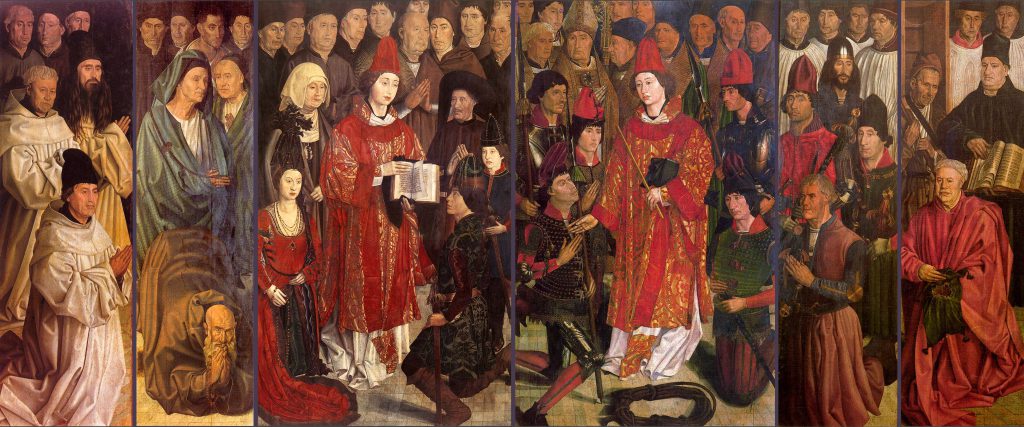
Lisbon, Museu Nacional de Arte Antiga: The six surviving mid 15th-century Saint Vincent Panels, attributed to Nuno Gonçalves. Image via Creative Commons.
The Saint Vincent Panels in Lisbon (see also Panéis de Sâo Vicente de Fora). Six surviving oak panels from a polyptych of more than twelve panels, attributed to the Portuguese painter Nuno Gonçalves (circa 1425 – circa 1491). Image via Creative Commons.
Formerly displayed at the Cathedral of Lisbon, these survivors are preserved at the Museu Nacional de Arte Antiqa in Lisbon. Depicting scenes of the Veneration of the Deacon Protomartyr Saint Vincent of Saragossa (died circa 304 CE) by 58 men and women of different ages and social stations, both secular and religious, the Panels (from left to right at present) represent: the Friars and Monks, the Fishermen, the Infante, the Archbishop or Bishop (facing forward at upper left), the Knights, and the Relic (a skull-bone fragment resting reverently on a cloth). The short-haired saint, richly robed as a Deacon in red and gold, appears twice, full-length. In these views, he holds a book either open, with both hands, or closed, wrapped in cloth, under his arm. On the proposed identifications of the persons depicted and the script of the double-columned book held open at the far right, see, for example, Saint Vincent Panels and The Saint Vincent Panels in high-definition.
The scenes gather men and women with different backgrounds and functions in specific moments of communal focus. The figures’ accessories or attributes include some books, shown both opened and closed. Their detailed depictions indicate specific forms, formats, and bindings; their openings show lines of text in one or two columns per page and approximately legible texts, as might be recognizable as individual or idealized specimens which may have existed in the known world.
As our new series advances, other images may come to the fore as we prepare and report the individual Episodes. The set of panels at Lisbon accord with the theme of the first Episode, focused upon the long-term development of a project dedicated to the images of books in works of art in various media (paintings and more) in the late medieval and early modern periods.
Episode 1 (July 2021):
Interview with Barbara Williams Ellertson
The BASIRA Project and a Timeline
The Series began with an Interview with our Associate, Barbara Williams Ellertson. (See also Ellertson.)
The Event took place via Zoom in July 2021, with a small invited audience, and with scope for questions, comments, and discussion. Barbara spoke about the BASIRA Project, its background, and her other interests. For information about the Project on Books as Symbols in Renaissance Art, its subjects, its scope, and its aims, see https://basiraproject.org.

Barbara and Milly meet at a conference.
Barbara described key stages in her education, upbringing, and career, as she offered an illustrated Timeline for the origins and development of the BASIRA Project. She presented a selection of images to exhibit aspects of her own work, the work of creating the project, several key stages in its evolution, and some favorites among the subjects which it covers. The Timeline takes the form of an 8-page Booklet, laid out in RGME Bembino, in the style of our recent Publications. The questions and discussion addressed a wide range of interests in the subject matter, the approaches to its structures in the database and metadata, the expanding coverage of the project, and its future work.
The recording of the event is being edited for presentation and wider viewing as a podcast. It will take two Parts, with the Interview and the Question-and-Answer portion. It should become available soon. Watch this Space.
See Barbara Williams Ellertson and BASIRA, with a Timeline.
We thank Barbara for her generous preparation and presentation. We thank the participants for joining the online gathering and offering feedback and encouragement. The informal, but structured, Event gave a superb beginning to our new Series. Congratulations!
Episode 2 (September 2021):
Presentation and Demonstration by Linda Civitello
“Southern Italian Cuisine before Columbus”
For an invited audience on Saturday, 18 September, 2021, the food historian Linda Civitello, PhD, talked about the early history of Italian cuisine, especially Cuoco Napolitano, and its ingredients, sources, and influences — for Southern Italian cuisine and beyond. Inspired by the 15th-century sources in manuscript and early printing, Linda described approaches to the subject and gave a demonstration. A recording of the event will soon become available.

Platina, De honesta voluptate et valetudine (Venice, 1494), Opening page. Image via Biblioteca Europea di Informazione e Cultura, via Public Domain.
Reference points for her talk:
- the late 15th-century Morgan Library & Museum, MS Bühler 19 (https://www.themorgan.org/
manuscript/77146) - Bartholomaeus Sacchi/Platina, De honesta voluptate et valetudine,
printed in Venice in 1487 and 1494 (https://data.cerl.org/istc/ip00766500 and https://data.cerl.org/istc/ ip00767000).
- Terence Scully with Rudolf Grewe, Cuoco Napoletano: The Neapolitan Recipe Collection (Ann Arbor: The University of Michigan Press, 2000).
By request, Mildred Budny presents a brief guide to the manuscript, printed, and online digital resources, leading to Linda’s presentation and demonstration, followed by a discussion with questions and answers.

Invitation Card to Linda Civitello’s presentation on 18 September 2021
See Southern Italian Cuisine Before Columbus, with Linda Civitello.
Episode 3 (November 2021):
A Roundtable
“Tales from the Library Crypt”
On 20 November 2021, with an invited audience, in a roundtable discussion, we explored ‘secrets’ and ‘treasures’ in bibliographical quests during a time of pandemic.

Worcester Cathedral, Crypt. Image from geograph.org.uk via Wikimedia Commons.
The plan:
Over the past year and more, under exceptional circumstances, there are doubtless to be encountered challenges and disappointments through closures of libraries, access to library resources, and other factors. But there can be successes, through serendipity, resourcefulness, friendship, and solidarity across institutions and wider readership. Comparing notes might offer tips and guidance. Commiseration can come in handy. And there are successes worth celebrating. There are stories to tell.
Speakers include Jessica Savage and Pamela Patton at the Index of Medieval Art at Princeton University; David Porreca at the University of Waterloo; and Linde Brocato at the University of Miami.
The recording might become available. We will confer with the participants about permission, just because that is the right thing to do.
See Tales from the Library Crypt.

Photo © Linde M. Brocato 2011. Cordoba, Passage.
Episode 4 (December 2021):
Presentation by Linde M. Brocato
“How to Be Indiana Jones in the Catalog”
In this Episode, our Associate Linde M. Brocato, scholar-librarian, reveals “How to Be Indiana Jones in the Catalog: Treasure and Power in/of the Bibliographical Record”.
Understanding the dynamics and rules of cataloging gives strong insight into how to search: When to use the basic search box, i.e. keyword search; when to use advanced search, i.e. the indexes. I will discuss the bibliographic record, the kinds of decisions catalogers make about how to encode information, and tools to release and enhance your power to find the bibliographic treasure you seek!
A downloadable 1-page Handout accompanies the presentation.
See How to Be Indiana Jones in the Catalog, with Linde Brocato.
Episode 5 (January 2022):
Presentation by Ronald K. Smeltzer

Dupain de Montesson, Le spectacle de la campagne and La science de l’arpenteur (1777), First Title-page, Vignette. Ronald K. Smeltzer Collection. Photograph Ronald K. Smeltzer, reproduced by permission.
“The Curious Printing History of
La Science de l’Arpenteur by Dupain de Montpasson”
For this episode, on 23 January 2022, our Associate Ronald K. Smeltzer examines a telling case of multiple editions of an eighteenth-century treatise on surveying by the French military engineer Louis Charles Dupain de Montesson (circa 1720 – circa 1790). Between 1766 and 1813, La science de l’arpenteur dans toute son étenduë (“The science of the surveyor in its full extent”) was issued in editions which exhibit changes from printing by intaglio, through a mixture of intaglio and letter-press, to letter-press in full. Some of the later changes were a direct result of the French Revolution (see also Révolution française).
Assembling examples of all the known editions of this treatise has taken twenty years. As Ronald reports, “the process attests to the value of direct inspection. This presentation describes the results.”

Dupain de Montesson, La science de l’arpenteur (1780), Title Page, Vignette. Ronald K. Smeltzer Collection. Photograph by Ronald K. Smeltzer, reproduced by permission.
See The Curious Printing History of “La Science de l’Arpenteur”, with Ronald K. Smeltzer.
Episode 6 (February 2022):
“Catalogs, Metadata, and Databases (Part I)”
A Roundtable
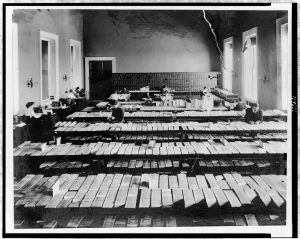
Card Division in the Library of Congress, Washington, D.C. Photograph circa 1900-1920. Image Public Domain.
Planned for February 2022, by special request, a roundtable discussion aims to consider challenges and opportunities encountered in making, and using, catalogs and databases — with a focus especially on bibliographical and manuscript materials.
Examples include the BASIRA Project on “Books as Symbols in Renaissance Art”, the Index of Medieval Art Database, Digital Scriptorium 2.0, the Pinakes/Πίνακες Database of Greek Texts and Manuscripts, and approaches to cataloging collections or source materials (such as artists’ books). Subjects for consideration are “Standards and Vocabularies in Art-History Cataloging”, “Labelling, Way-finding, and Meaning”, “About ‘Aboutness’ “, “Teaching Cataloguing Today”, “The Pinakes Database”, “Digital Scriptorium 2.0: Manuscript Description in a Linked Open Data Context”, and more.
See Catalogs, Metadata, and Databases (Part I).
As intended, this Roundtable prepared the way for the Session on “Catalogs, Metadata, and Databases (Part II)” in our 2022 Spring Symposium. It took place by Zoom on Saturday, 2 April 2022, with most of the same participants in the Roundtable. See 2022 Spring Symposium on “Structures of Knowledge”.
We plan for Part III in the 2022 Autumn Symposium scheduled for Saturday 15 October 2022 (online or hybrid). See 2022 Autumn Symposium on “Supports for Knowledge”.

Vassar College, Frederick Thompson Memorial Library, Entry, Ceiling and Gobelin Tapestry Series.
Episode 7 (July 2022)
“Falling in Love with a Source . . .
Or: How Much fou Is There In This amour?”
– An Interview with Michael Allman Conrad
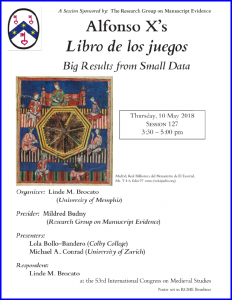
2018 Poster for ‘Libro de los juegos’ Session
Planned for Saturday, 23 July 2022, our Associate Michael Allman Conrad (see also his Curriculum Vitae) will consider, in conversation, the choice of subject for his Ph.D. Dissertation and its resulting book, in the light of the journey toward discovery involved in the process. Michael received the Ph.D. from Humboldt University, Berlin, in 2021. The book was recently published:
- Michael A. Conrad, Ludische Praxis und Kontingenzbewältigung (De Gruyter, 2022)
“Ludic Practice and Dealing with Contingency in the Book of Games of Alfonso X and Other Sources from the Thirteenth Century: Games as Models of Good Decision-Making”
The detailed examination, years in the making, as both Michael and the world changed, centers upon the remarkable Libro de los Juegos, or Book of Games commissioned by King Alfonso X of Castile.
Already in conversations and with presentations for Research Group events, we have had the opportunity to learn about Michael’s approach to these and other materials of study. (See our Reviews.) For this Episode of “The Research Group Speaks”, we look forward to hearing more about the origins, sources, opportunities, challenges, choices, and discoveries involved in engaging in the quest that is this “Love Story”.
See Falling In Love with a Source: An Interview with Michael Allman Conrad.
Episode 8 (Saturday 17 September 2022)
“Tarzan-Moves of the Mind — or — Brachiation in Research:
Going from Indiana Jones’ Big Picture
to Effective Research Moves”
Linde M. Brocato

Color cover of the book Tarzan of the Apes by Edgar Rice Burroughs (1914). Image Public Domain via Wikimedia Commons.
Episode 8 complements Episode 4 on “How to be Indiana Jones in the Catalog: Treasure and Power in/of the Bibliographical Record” . This time, another imaginary figure takes the stage, or climbs the ropes.
Our presenter Linde M. Brocato, scholar-librarian, is Associate of the Research Group on Manuscript [and Other] Evidence, and long-time contributor to our events of various kinds. On her experience and expertise, see Linde Brocato, Linde M. Brocato, Curriculum Vitae, and Google Scholar.
She describes the plan for the Episode:
This workshop / demonstration of how to leverage the power of the bibliographical catalog follows up on Dr. Brocato’s presentation in Episode 4 on 11 December 2021, “How to be Indiana Jones in the Catalog: Treasure and Power in/of the Bibliographical Record” (see above). The next installment applies those ideas and techniques to specific bibliographic problems.
I invite submissions of irritating and evasive bibliographic problems for a demonstration of how I would go about solving them. Let’s see if we can!
See How to Be Tarzan in the Catalog, or, Brachiation in Research.
Episode 9 (Saturday 19 November 2022)
“The Making of The Book of Kells: The Making of a Masterpiece”
Donncha MacGabhann
In an informal Conversation or Interview with the author, our Associate Donncha MacGabhann speaks about his new book on The Book of Kells: The Making of a Masterwork (Leiden, 2022).
As one of the chief treasures of the Library of Trinity College Dublin (since at least 1661), and the subject of widespread fame, the Book of Kells might need no introduction.
- Dublin, Trinity College Library, MS A. I. [58], the Codex Cennanensis, now with 340 vellum folios, bound (since 1953) in four volumes.

Front Cover of Donncha MacGabhann, “The Book of Kells: A Masterwork Revealed” (2022).
Donncha’s Book has emerged from his detailed study for the Ph. D. dissertation (London, 2016), as well as his own experience as an artist. For our Episode, he will tell us about the making of his Book on the making of the Book of Kells . . .
His Book:
- The Book of Kells. A Masterwork Revealed: Creators, Collaboration, and Campaigns
(Leiden: Sidestone Press, 2022).
The Ph.D. dissertation leading up to it is freely available for download:
- The making of the Book of Kells: two Masters and two Campaigns (Doctoral thesis, University of London, 2016) https://sas-space.sas.ac.uk/
6920/ (via Creative Commons)
For the first time in our Series, the registration for this Episode will be automated through a registration portal. Details will appear on the webpost announcing the Episode.
See Donncha MacGabhann on The Making of The Book of Kells.
Episode 10 (Saturday 18 February 2023)
“Stages of Composition:
Charlotte Brontë’s Fair-Copy Manuscript for Shirley”
Barbara Heritage

The First page of the First Edition of ‘Shirley’ by Charlotte Brontë (1849). Image Public Domain via Wikimedia Commons.
For Episode 10, Barbara Heritage of the Rare Book School at the University of Virginia will describe discoveries in her long-term research on the work of Charlotte Brontë (1816–1855) as revealed by examining the manuscript materials and processes embedded in their pages.
Studying the fair-copy manuscript of Brontë’s novel Shirley (London, British Library, Add MS 43479 in three volumes), published in 1849, Barbara reports that
A close codicological study of the manuscript offers an alternative reading by drawing on the correlation of paper stocks and varying pagination, providing new material-based evidence for how Brontë strategically and deliberately revised — and even expanded — her manuscript after serving as the primary caregiver for her siblings.
Please see the dedicated webpost for this Episode for more details, including a brief list of Barbara’s many publications on this author and related subjects.
Episode 11 (Saturday 8 July 2023)
“Gamified Numbers: The Next Installment”
Michael Allman Conrad
Our Associate Michael Allman Conrad returns for a second visit to our series, following his Interview for Episode 7 in July 2022 on “Falling In Love with a Source”, the choice for his Ph.D. dissertation and its published book.
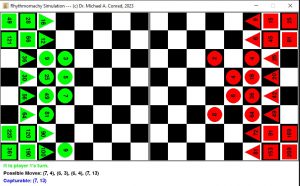
Rhythmomachy Simulation (Player 1’s turn). Image © 2023 Michael A. Conrad.
This time, he will elaborate on the subject (and long-term project) introduced in his presentation for one of our Sessions in May at the 2023 International Congress on Medieval Studies. (See our 2023 Congress Program.)
“Gamified Numbers:
Board Games as Educational Instruments for Teaching Astrology and Other Quadrivial Arts“
Published on our website, the Abstract for his paper provides a glimpse and sketches further plans for his explorations on the subject.
Join the Episode to hear more about the project, have the opportunity to ask Michael questions, and learn about the quest.
See Episode 11 with Michael Allman Conrad on Gamified Numbers.
Registration portal via our RGME Eventbrite Collection.
See Episode 11: Michael Allman Conrad Speaks on “Gamified Numbers”: Tickets.
Episode 12 (Saturday 12 August 2023)
“The Sources of the Engraved Magic and Astrological Images
in the Book of Sigils (Liber Sigillorum)
and the Ghāyat al-Hakīm (The Goal of the Wise)”
Vajra Regan
Our Associate, Vajra Regan (see also Vajra Regan) will speak about the subject of his forthcoming joint publication, in an exploration of visual imagery for astrological magic as transmitted across time, languages, and cultural settings. In Vajra’s own words:

Martin, Slovakia, Slovak National Library, Fragment of the Picatrix, circa 1400 CE. Image Public Domain via Wikimedia Commons.
As part of the series “The Research Group Speaks,” I examine the Hermetic Liber planetarum and its connection to two important books of magic, the Liber sigillorum of Techel and the Ghāyat al-Hakīm (غاية الحكيم) or Picatrix. The talk both summarizes and expands on the research that Lauri Ockenström and I have presented in our recent article, “The Hermetic Origins of the Liber sigillorum of Techel” (The Journal of Medieval Latin 33 [2023]).
Tracking these relationships in both text and image shows that the images in the Liber sigillorum exhibit remarkable similarities to those in the Ghāyat al-Hakīm, while their origin lies in the Latin translation of the Liber planetarum preserved in a manuscript in Florence (Biblioteca Nazionale Centrale, II.III.214). This research also suggests that the lost Arabic original of the Liber planetarum was one of the sources of the Ghāyat al-Hakīm. In turn, surveying other Hermetic texts translated into Latin in the twelfth century, in the same group as the Liber planetarum, suggests that they too might transmit some of the sources of the Ghāyat.
Here is a case where close study of both images and accompanying texts makes it possible to discern — as if to reverse engineer — patterns of transmission and diffusion across languages and cultures in the history of magic, astrology, and imagery. Join the Episode to learn more and ask questions!
For information see Episode 12: Vajra Regan on Engraved Magic and Astrological Imagery.
To register for the Episode, visit Episode 12: Tickets.
*****
Episode 13 (Saturday 23 September 2023)
“Making Digital Codicology: Research and Writing in Community”
Bridget Whearty
Episode 13 showcases the work of Bridget Whearty, Associate Professor of English, General Literature and Rhetoric at Binghamton University, State University of New York (see her Curriculum Vitae). She will speak informally about her work and research interests, including her recent book on Digital Codicology: Medieval Books and Modern Labor (Stanford University Press, 2022). See, for example, her observations for Medieval Books and Modern Labor.

« Le Champion des Dames » (1440) by Martin le Franc, via gallica.bnf.fr from Bibliothèque nationale de France. Département des manuscrits. Français 12476, folio 78r, detail.
We learned about her work in an earlier stage, when she described its potential and significance at the 11th Annual Symposium of the Schoenberg Institute for Manuscript Studies on “Manuscript Studies in the Digital Age” in 2018. (You can view the presentation here.)
We look forward to hearing more about the quest, along with its challenges, discoveries, and recognition of the people behind the books.
Come to think of it, that meeting with the people “in” the books is what we try to do with studying or encountering medieval and other old books, only without being able to meet the people in person . . .
For information see
You can register for this event by our RGME Eventbrite Collection.
To register for Bridget’s Episode 13 within the Collection, visit
- This portal.
*****
Episode 14 (Sunday 19 November 2023)
“Translating by Committee: The Latin Hermetica“
David Porreca, Dan Attrell, and Brett Bartlett
Episode 14 gives the opportunity to hear a team of teacher, student, and former student describe the challenges and choices in approaching the next text in their series of translations from Latin texts. The team includes two of our RGME Associates, who have spoken at RGME events including previews of their earlier translations which have attained publication.

The Book Signing at the 2019 Congress. Photography Mildred Budny.
Those published translations are:
- Marsilio Ficino, On the Christian Religion. Translated from the Latin with an Introduction and Notes by Dan Attrell, Brett Bartlett, and David Porreca (Toronto, Buffalo, and London: University of Toronto Press, 2022)
- Picatrix: A Medieval Treatise on Astral Magic. Translated with an Introduction by Dan Attrell and David Porreca. Magic in History (University Park, Pennsylvania: Penn State University Press, 2019)
For this Episode, we can learn from the team as the source about the processes of translation and the intended product, plus its audience. The task can, in certain cases such as this one, call for collaboration by a combination of translators bringing different (and overlapping) perspectives, experience, and expertise to the table.
The Episode offers the chance to listen, perchance to learn, and to ask the team about their principles, practices, and lessons in the work of translation — a subject of enduring importance in the history of human communication from one individual to another, one time and place to another, and one culture to another.
For information, see
To register for this Episode, visit
*****
Episode 15 (Saturday 20 January 2024)
“Women Writers from the Medieval to Post-Modern Periods”
Jaclyn Reed, Linda Civitello, and Hannah Goeselt

Christine de Pizan, La cité des dames. Paris, Bibliothèque nationale de France, Département des Manuscrits, Français 1179, folio 3 recto. Image Public Domain via gallica.bnf.fr.
This time, scholars, teachers, and writers will speak about their interests, long-term work, and current projects concerned with the writings of women authors across a long span of time. Reflecting womens’ roles, opportunities, constraints, and resourcefulness, the writings cover a wide range of spheres, subjects, approaches, and styles. The works range from literary creations to recipes for cookery.
See Episode 15. Women Writers from the Medieval to Post-Modern Periods
To register:
Visit Episode 15 “Women Writers from the Medieval to Post-Modern Periods” Tickets
*****
Episode 16 (Saturday 22 June 2024)
“An Interview with Jesse D. Hurlbut”
Interviewer: Mildred Budny, Director of the RGME

Jesse Hurlbut at the Bonneville Salt Flats, Utah. Photograph Jesse Hurlbut.
In this Episode, Jesse D. Hurlbut, RGME First WebMaster Emeritus, will speak informally about his contributions to manuscript studies, websites, digital access, and other interests.
This event follows upon the 2024 Anniversary “Manuscript (HE)ART”, held online on Saturday 24 February 2024, as the first in the RGME’s Symposia for the 2024 Anniversary Year:
Taking its title from Jesse’s website Manuscript Art: Taking a Closer Look, with the design of the Co-organizers Katharine C. Chandler and Jessica L. Savage, the Symposium is designed to gather Jesse’s former students, colleagues, and friends, to consider subjects in manuscript and other studies of interest to him.
Now, the Episode gives the chance to hear him, learn more about his interests, and join the conversation.
Information about the Episode:
Register for the Episode:
*****
Episode 17 (Saturday 21 September 2024)
“RGME History, Impact, and Prospects:
Anniversary Reflections”
This Episode offers Anniversary Reflections for the Research Group, as we draw on highlights of our history, reflect on memories and people, and bring forth observations from living memory. In keeping with the Theme of our Anniversary Year, Bridges, this Episode brings the opportunity to share recollections, with series of comments in a roundtable conversation.
Subjects include recollections of people, events, and landmarks in the history and legacy of the RGME as we celebrate our heritage and achievements during the 2024 Anniversary Year and beyond. For example, we wish to bring forth the memories preserved in Oral Tradition, with their stories to tell and people’s memories to preserve and share. People to remember include our Trustee Vivien Law, our Honorary Trustee Giles Constable, and others.
In preparation, we would circulate a survey asking people if they would like a) to propose ideas beforehand for an open discussion, such as recollections of particular events and/or people in our history; b) to share some reflections or comments in the roundtable; and c) to make other suggestions. Also, might you have some souvenirs or photographs from RGME events that you would like to share with the audience of the Episode and/or with the RGME Library & Archives?
We encourage you to join the conversation and celebration.
Information about the Episode:
Register for the Episode:
*****
Episode 18 (Saturday 14 December 2024)
“Women as Makers of Books”
As a pendant to Episode 16 which opened our 2024 Anniversary Year in January, we round out the year with another Episode centered upon the creativity and creations of women in multiple aspects of the production of books. At the start of the year, we considered women writers, in texts ranging from literary works to cookbooks. Now we examine ways in which women contributed to the making of books from calligraphy to illustrations and from the inside out. Periods under consideration include the Arts and Crafts Movement.
Information about the Episode:
Register for the Episode:
*****
Episode 19, Etc.
Further Episodes are being planned.
Suggestions are welcome. Watch this Space.

Florence, Galleria degli Uffizi, Anonymous, Still Life, German school of the XVI century, circa 1510, oil on wood, 70.2 × 65 cm. Opened book with fanned leaves showing pages of text and music set out in double columns and adorned with decorated initials and illustrations. Image via Wikimedia, public domain.
*****
Our plans for 2023 flow from the momentum of events and activities of 2022. Last year, our plans included episodes which could interlink with, or augment, our sessions for the 2022 International Congress on Medieval Studies. For those sessions, see our 2022 Congress Program.
Similarly, some episodes would lead to, flow from, and augment the pair of Symposia in the Spring and Autumn. For 2022, they were dedicated to the year’s Theme of “Structured Knowledge”. The Theme for 2023 is “Materials and Access”.
- 2022 Spring and Autumn Symposia on “Structured Knowledge”
- 2023 Spring and Autumn Symposia on “Materials and Access”
*****
Do you have suggestions and comments for the Series? Please leave your Comments here, visit our Research Group Facebook Page, or Contact Us. We look forward to hearing from you.
*****
